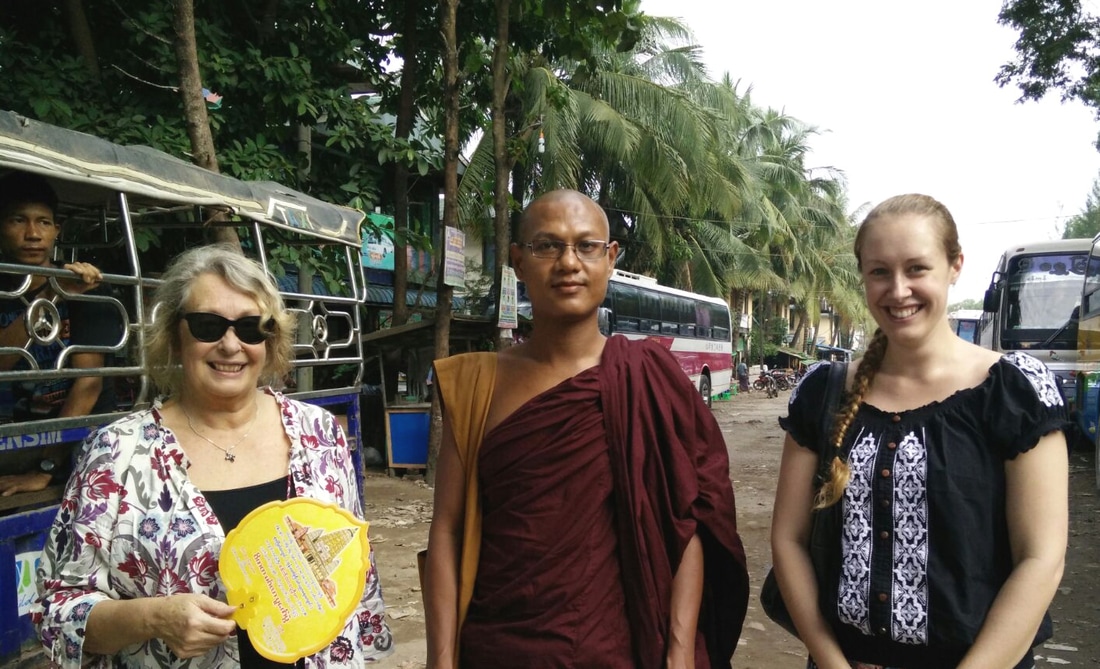|
What counts as ‘correct’ English? Is it that of the BBC or Hollywood? Should it be based on usage or grammar rules? This is an area of intense debate in the English teaching world; something which I don’t think will ever be solved. I once met an Italian who told me that he thought that his English was good until arriving in London where he was able to understand nothing nor be understood by anyone! I know a teacher from Yorkshire whose class of Chinese learners said “ I’m off t’bus station” because that’s how she speaks. It is a very well known battle among ESL teachers to convince students to read abbreviations out loud from a passage instead of correcting to the full form. One day in Sittwe, my mum asked one of our trainees if she could see the monastery. During the visit, we sat with a group of teachers and a couple of monks. The group was very silent as our trainees tend to be; both from a fear of the unknown and a lack of wanting to embarrass themselves with low-level English. In order to fill the silence, my mum was telling the group about the county shows that we have in England where vegetables are judged by size and general health, and people bake cakes and make chutneys for judging. In my village in England, people don’t use the past participle with the auxiliary verb had. They use the past form of whichever verb they want to use, while keeping the past participle to use a simple past construction. It is something which, I’ll be honest, bothers me. I notice when my friends use the grammatically incorrect version. A friend would say to me “I’ve not took a shower yet today” or “She only done her homework last night!” My mum also follows this usage; in our area it is correct English; it is the first and only language after all. However, to my mortification and slight amusement, our trainee monk picked my mother up on her incorrect use of the present perfect tense! Further, it wasn’t phrased as a question of why she was using one form instead of the other, but rather as a correction. Mum took it quite well, countering his boldness with a quip about him being on his phone during class. (He had been texting while the meeting was happening.) Afterwards, my mum did remark on what she perceived as his rudeness. I was amazed that a student would be forward enough to comment on a native speaker’s usage in a negative and not questioning way. I think because the trainee in question is in his mid-30s and is a monk, he is more confident in himself and in his English ability than the very young teachers.
I know that many of the students did have problems with understanding her as she speaks quickly, with many colloquialisms and has a strong accent as well as non-standard grammar. As with most lay people who don’t have much experience talking to people who have a low-level of English, my mother would often rephrase her sentence several times at once when asked to repeat something. This is confusing for a listener who may simply not have heard all of the words the first time around. They almost have it, but then have 3 new sentences to process with a mix of new and familiar words. Equally, she found it hard to understand some of the students; it actually made for a good test of English for them; can Teacher’s mother understand a basic conversation or does Teacher need to translate? I was pleased to find that with our trainee who has been in Yangon for the past 6 months attending an English school was able to converse with my mother. He spent 4 or 5 hours with us. The first hour was slow; he was embarrassed and shy and my mum struggled to understand him which exacerbated the shy embarrassment. However, after the adaptation period, he was able to understand her accent and nuances remarkably well, and provided that he kept his hand away from his mouth, she could understand the majority of what he said to her. Surprisingly, my mother chatted best with a young monk with whom I haven’t had much conversation at all. He was described to her as a master of meditation by his fellow monks, however she soon discovered that he enjoys watching football on TV and that his hours spent meditating might not be as pious after all! The pair of them nattered on about Chelsea, White Hart Lane and José Mourinho for a good half an hour much to my amazement! Chloe Smith NEH Director of Studies and Teacher Trainer Related Posts: Mum Visits Myanmar Meeting Families in Kyauk Taw Forest Friday Van's Visit to REC Minbya and Mrauk Oo Visit Donors Visit School in Thanlyin Myanmar National Races Village Visit Visit to Htoo Chaung Village
Comments
|
This section will not be visible in live published website. Below are your current settings: Current Number Of Columns are = 3 Expand Posts Area = 1 Gap/Space Between Posts = 20px Blog Post Style = card Use of custom card colors instead of default colors = Blog Post Card Background Color = current color Blog Post Card Shadow Color = current color Blog Post Card Border Color = current color Publish the website and visit your blog page to see the results |
|
© New Education Highway 2024
Except where otherwise noted, content on this site is licensed under a Creative Commons Attribution 4.0 International License. |



